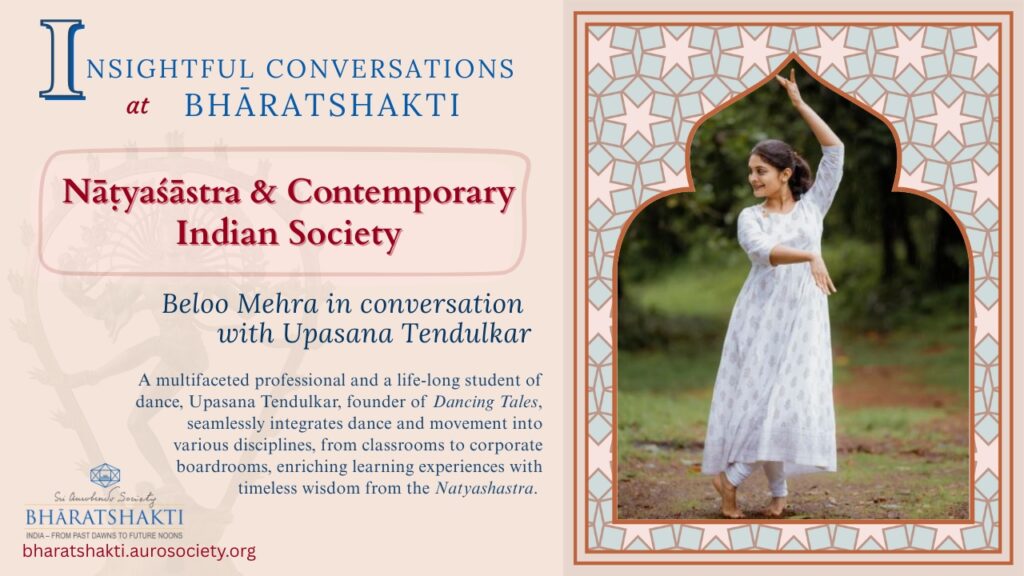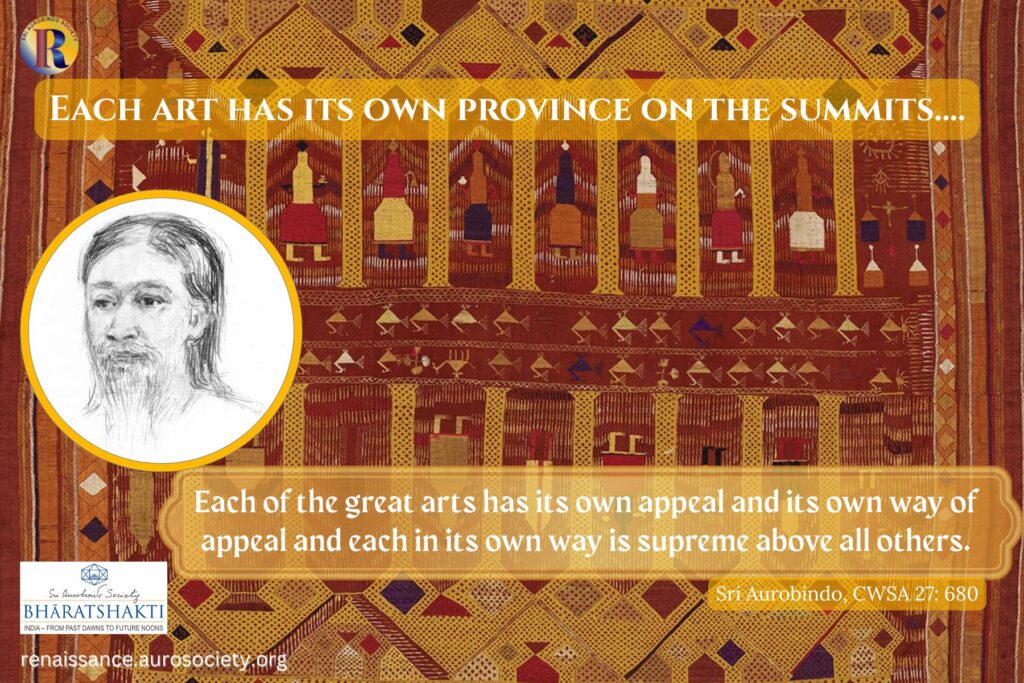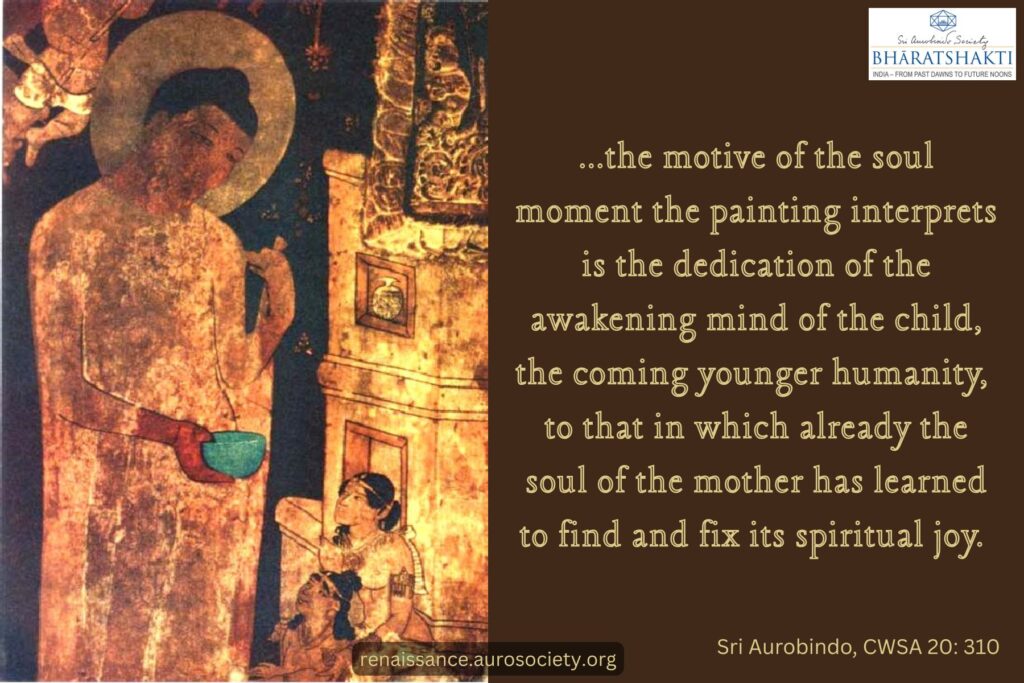Volume V, Issue 11-12
Author: Sri Aurobindo
Editor’s Note: The Mother once said that true art must be an expression of the Divine in life and through life. It is because of an intimate relation of great art with Life, that certain literary and artistic works feel so ‘alive’ even after thousands of years when they were first composed or carved or painted. Their distinct living quality makes them relatable and fresh across time and context.
To find a valuable insight into the reason for this, read these highly poetic prose passages by Sri Aurobindo. These works of art were the outpourings of poets and artists who had the power to become one with all that was around them. These creators were complete, vast, multitudinous, infinite in a way, impersonal & many-personed in their very personality. They were “not divine workmen merely but true creators endowed by God with something of His divine power and offering therefore in their works some image of His creative activity.”
Read to find out what makes them “true creators” and explore the relation of Art and Yoga. These passages also help us reflect on the Mother’s words: “The discipline of Art has at its centre the same principle as the discipline of Yoga.”
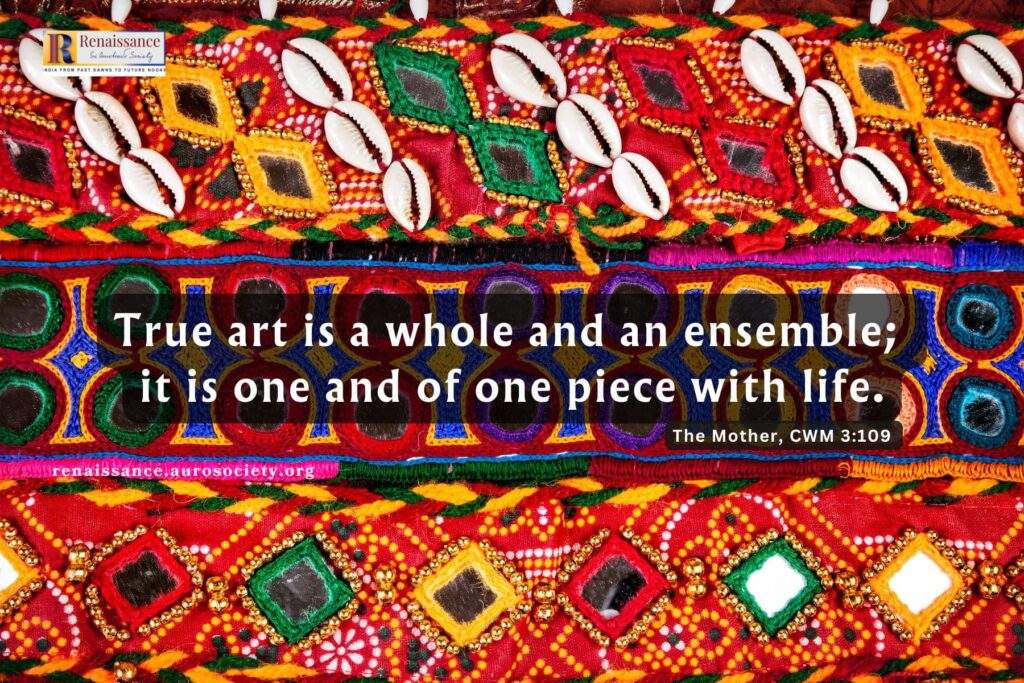
For the purpose of this digital presentation, we have made a few formatting revisions without changing the text. And we have also added a few headings for ease of online reading.

The Voices of the Poets
Out of the infinite silence of the past, peopled only to the eye of history or the ear of the Yogin, a few voices arise which speak for it, express it and are the very utterance and soul of those unknown generations, of that vanished and now silent humanity. These are the voices of the poets.
We whose souls are drying up in this hard and parched age of utilitarian and scientific thought when men value little beyond what gives them exact and useful knowledge or leads them to some outward increase of power & pleasure, we who are beginning to neglect & ignore poetry and can no longer write it greatly & well, — just as we have forgotten how to sculpture like the Greeks, paint like the mediaeval Italians or build like the Buddhists,– are apt to forget this grand utility of the poets, one noble faculty among their many divine and unusual powers.
Poetry written out of the soul
The kavi or vates, poet & seer, is not the manishi; he is not [the] logical thinker, scientific analyser or metaphysical reasoner; his knowledge is one not with his thought, but with his being; he has not arrived at it but has it in himself by virtue of his power to become one with all that is around him.
By some form of spiritual, vital and emotional oneness, he is what he sees; he is the hero thundering in the forefront of the battle, the mother weeping over her dead, the tree trembling violently in the storm, the flower warmly penetrated with the sunshine. And because he is these things, therefore he knows them; because he knows thus, spiritually & not rationally, he can write of them. He feels their delight & pain, he shares their virtue & sin, he enjoys their reward or bears their punishment.
It is for this reason that poetry written out of the intellect is so inferior to poetry written out of the soul, is,– even as poetical thinking,– so inferior to the thought that comes formed by inscrutable means out of the soul.

First be the things of which you would write….
For this reason, too, poets of otherwise great faculty, have failed to give us living men and women or really to show to our inner vision even the things of which they write eloquently or sweetly, because they are content to write about them after having seen them with the mind only, and have not been able or have not taken care first to be the things of which they would write and then not so much write about them as let them pour themselves out in speech that is an image of the soul.
They have been too easily attracted by the materials of poetry, artha & shabda; drawn by some power & charm in the substance of speech, captivated by some melody, harmony or colour in the form of speech, arrested by some strong personal emotion which clutches at expression or gropes for expression in these externals of poetry they have forgotten to bathe in the Muse’s deepest springs.
True creators endowed by God
Therefore among those ancient voices, even when the literature of the ages has been winnowed & chosen by Time, there are very few who recreate for us in poetic speech deeply & mightily the dead past, because they were that past, not so much themselves as the age & nation in which they lived and not so much even the age and nation as that universal humanity which in spite of all differences, under them and within them, even expressing its unity through them is the same in every nation and in every age.
Others give us only fragments of thought or outbursts of feeling or reveal to us scattered incidents of sight, sound and outward happening. These are complete, vast, multitudinous, infinite in a way, impersonal & many-personed in their very personality, not divine workmen merely but true creators endowed by God with something of His divine power and offering therefore in their works some image of His creative activity.

Penśees
God has a personality but no character; He is as we say in our Eastern thought, Anantaguna, of an infinite variation of qualities without fixed limitation or rigid distinction and incompatibility.
His superhuman cruelty melts into and harmonises with His ineffable pity; His fierce enmity is one mask of His intensest love. For, being alone existent, He is irresponsible and the harmonies He creates, are the figment of His own plastic will and governed by laws of aesthetics determined in His own unfettered but infallible fantasy. Out of His infinite personality He creates all these characters & their inevitable actions & destinies. So it is with every divine creator,– with Homer, Shakespeare, Valmiki, Kalidasa.
It is perfectly true that each has his own style of language & creation, his own preferred system or harmony of the poetic Art, just as the creator of this universe has fashioned it in a particular style & rhythm & on certain preferred & fixed canons, differing from that of the other universes He may have built in His infinite Being. But within that style & harmony they are not bound by any fixed personality. It is rather the infinite they express though through their personality, than their personality through their works.
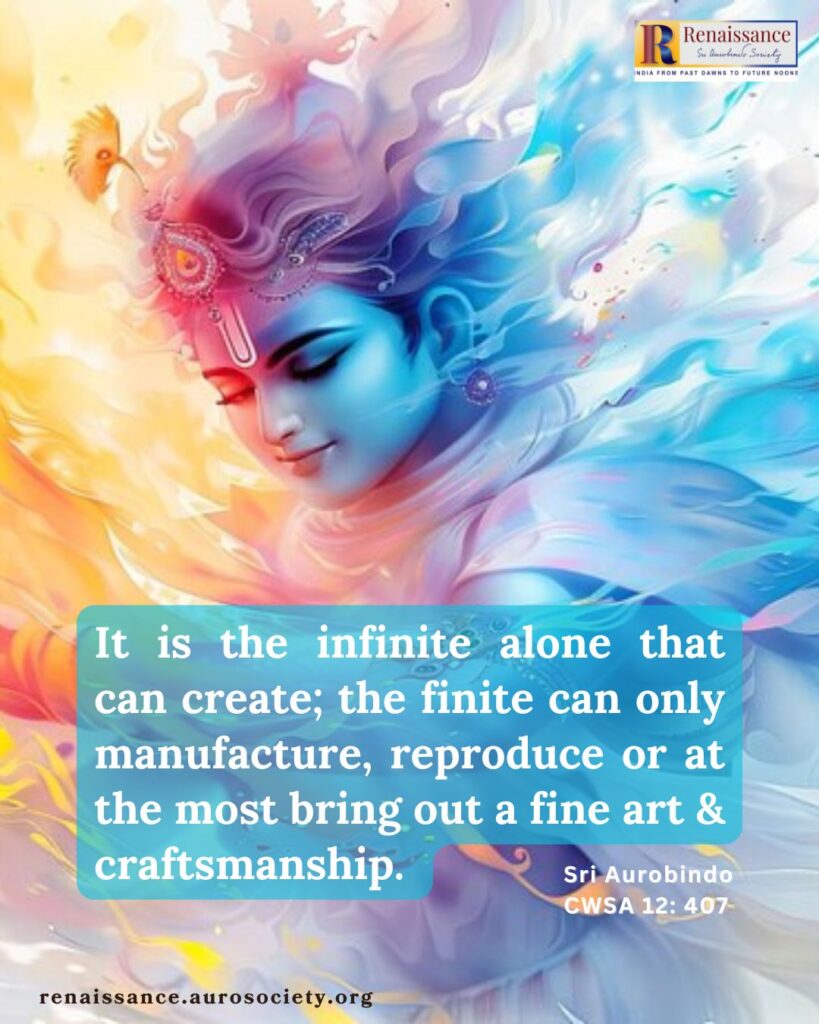
The infinite alone can create
The writers who are limited by their personality may be among the fine artists of literature; they cannot be among the greatest creators; for to the creator freedom & infinity are necessary attributes. It is the infinite alone that can create; the finite can only manufacture, reproduce or at the most bring out a fine art & craftsmanship.
Among all the Elizabethan dramatists Shakespeare alone has produced living men; the rest are only admirable, trivial or monstrous sketches, caricatures or images of men. There is, however, one exception to this rule; every man can at his best moments cast out, create in some way or another– for in our Indian languages the word for creating is casting out, letting free out of one’s own being– one living creature & character,– himself.
Milton has produced several bold & beautiful or fine outlines or descriptions, but only one living being, the rebel Archangel Satan, and only so in the first four books of Paradise Lost does Satan really live. When Milton ceases to portray himself in his fallen state and thinks only of his plot & subject, Satan also ceases to live.
But the great impersonal creators even in their slightest creations, cannot help creating life.
Impersonal, I say, but I do not mean by impersonality the nirguna, devoid or pure of quality, but rather the unfixed & unlimited by quality, –an infinite & indefinable personality out of which is not manufactured or cunningly shaped but perfectly & inevitably arises under the compelling eye of an intuitive Will to be this created world of innumerable brilliantly-coloured variously outlined individual existences.

~ Design: Beloo Mehra

